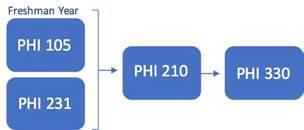Advice from the Major & Minor Coordinator
Greetings to all Philosophy Majors, Minors and anyone interested in the Philosophy Department,
I am the Philosophy Department Major and Minor Coordinator, which means that I offer academic major/minor advising to all Philosophy Majors and Minors. You are invited and very welcome to be in touch with me for academic advising during the Fall, Winter and Spring semesters when I hold weekly office hours in person as well as on Zoom or by telephone. My availability is limited during the Summer months but if you are a Philosophy major and have a pressing advising need please send me an email.
Now is always a great time to update your academic and career plans by exploring how your Philosophy major supports your post-graduate goals. What is an experience you want to have in your Philosophy major and how will you to achieve it? Do you know all the academic requirements and different opportunities in the Philosophy major? Is there a minor or certificate program that will enhance and complement your skill set? Do you know about some of the important offices on campus who can support you in your academic journey, such as the Center for Career and Professional Development and the Center for Post Graduate Opportunities? I’d love to talk with you about your goals and plans.
The Philosophy major has several courses that build on each other in a sequence, so it is important to plan accordingly. Keep the following guidelines in mind:

• Enroll in PHI 105 and PHI 231 as soon as possible, followed by PHI 210 the next semester and PHI 330 soon afterwards. Note that you do not need to take PHI 105 and PHI 231 in the same semester, but you should take both during your freshman year.
• PHI 231 is a prerequisite for many courses in the major.
• If you choose to take the PHI 204 Logic course (an option in Part Four of your major requirements), complete PHI 105 first. PHI 105 is not a formal prerequisite for PHI 204, but will make you better prepared for it.
• If possible, avoid taking more than three courses in the major within the same semester.
• Consider the many courses in Philosophy that fulfill general education requirements as well as major requirements. Taking courses that fulfill both types of requirements will allow you to progress through the major more efficiently.
• Though students can choose 200 level course options throughout the Philosophy major, we encourage you to challenge yourself by selecting 300 level courses whenever possible.
• Remember that you will need at least a 2.0 in the major and at least an overall 2.0 GPA to graduate.
Sending you all my best,
Professor Amie Macdonald